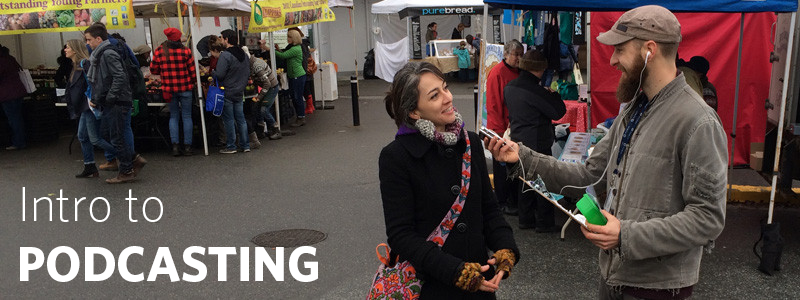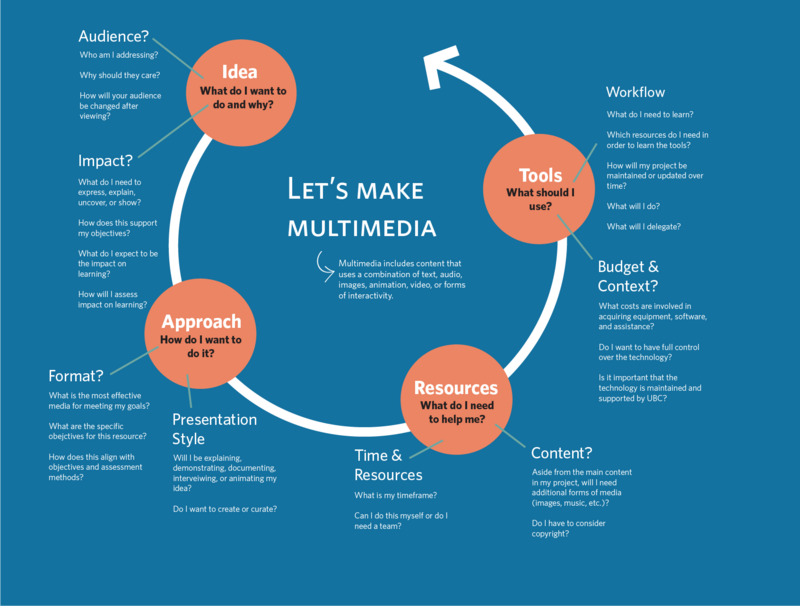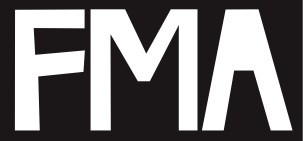LFS:Workshops/Audio and Podcasting

Link: http://bit.ly/UBCpodcast
Slides: https://bit.ly/UBCpodcast2023
Why podcast?
- Reach a new audience/the public
- Re-purpose research
- It’s satisfying and fun to make stuff
- Provides a creative outlet
What is a podcast?
- Audio on the internet, typically on an RSS feed
- Q & A
- Edited interview
- Call-in
- Narrated segments
- Anthology
- Immersive story / documentary
- Fiction
- Sometimes seasons of a fixed number of episodes
Plan it!

UBC's DIY Media guide
Equipment

- Use the best gear you can get
- Use your phone if needed, however...
- Can't monitor
- Handling noises
- How good are you about storage and battery life?
- External mics can mitigate some of this
- Field recorders
- Mics with mixing boards
- Let's you control different levels
Microphone Talk
- USB mics
- Vocal mics
- The ubiquitous SM-58
- Shotgun mics
- Shock mount or pistol grip to reduce handling noise
- Lavalier
- Best for recording voice in a noisy environment
- Boundary
- Great for transcription, bad for broadcast
UBC resources
- Chapman Learning Commons
- UBC Studios
- CiTR Radio
- Your faculty?
- Off-campus: VPL Inspiration Lab
Recording
- Get as close to the thing you're hoping to record as you can
- Know the space
- Consider the room size, number of participants & ambient noise
- WIND IS THE WORST
- Use the appropriate equipment
- Check equipment beforehand, especially batteries, cables & storage
- Test your levels
- Bring headphones. They are your audio superhero cape
- Recording in WAV gives you more flexibility and fidelity than MP3
- Noise reduction can only do so much
- Chrome MusicLab Spectogram
- Remember room tone
Recording From Afar
- Skype and Zoom will record your calls
- Need a message? Have someone leave a voicemail on your office phone
- Physical and app-based wiretaps
- Tape A Call
- iPhones in iOS 18 & Android record calls now too
- Services like Riverside, Cast, Zencastr and SquadCast
- Record a double-ender, with a reference track
- This leans heavily on your, and your interviewee’s, technical prowess
Our Robot Overlords
- Apple Podcasts' transcription & other transcription services
- Stable Audio AI: music generation
- Adobe Pocst Enhance: quick noise removal
- AutoPod for editing video podcasts
- Text-to-speech and voice cloning
- Google's NotebookLM
Further reading
- NPR: The ear training guide for audio producers
- The best kept secret in podcasting? Not really, but okay.
Soundscapes
- There are four components to radio/podcasting:
- voice, music, silence & sound
- How can you tell your story in sound?
- Think in terms of movie shots: wide-angle, landscape, close-up
Saving & Archiving
- Open a new folder for each project
- Always keep your original, unedited files
- Choose a naming convention
- i.e. date-project-dentifier.mp3, 20230415_LFS400_InterviewDean.mp3
- Back up your work (drives & cloud)
Editing
- Audacity
- PRO
- Free
- Cross-platform and open source
- Relatively straight-forward to use
- Lots of help online
- CON
- lossy
- can be glitchy as heck
- PRO
- Adobe Audition, free for UBC faculty and staff
- Hindenburg & Reaper are other popular DAWs (digital audio workstation)
Further reading
- Audacity Cheat Sheet (PDF)
- Audacity: Support
- NPR: How to mix: 8 steps to master the art of mixing audio stories
- Transom: Sharing Sessions, Part 1: Organization
Hosting & Promoting
- Blogs work well for RSS & info pages
- File storage
- Libsyn is the best established
- Soundcloud
- Anyone try Anchor?
- Ask your IT dept
- Case study: LFS400 Showcase Podcast
- Partner with a media organization
- CiTR, Co-op Radio, and others
- Submit to podcast directories
- Find your audience
- Use social media
- Audience interactions
- Segments, inside jokes, personality
- How can you partner with other podcasts in your space?
Storytelling
Dramatic Structure vs The Inverted Pyramid
Traditional media

Diagram by Christopher Schwartz CC BY-SA 3.0, via Wikimedia Commons
Narrative structure
Dramatic structure
A story...
- is someone doing something for a reason
- builds tension
- has stakes
- has a beginning middle and an end
- has a hook
One simple way to test whether your story is worth telling on the radio is to tell it to your friends, and notice how you feel. Do you feel like you’re dragging through one tedious moment after another, always on the verge of losing their interest, and sometimes you’re not even sure what the story’s about or why you’re telling certain parts? Or are your friends laughing and buying you drinks and begging you for more details about the characters? When you’re done, does everyone at the table launch into an excited discussion of similar things that happened to them? Heed these signs. If you can’t tell the story compellingly to a friend, it means either you haven’t figured out what the story is really about, or much more likely it never will be possible to tell this story compellingly over the radio.
(Also notice, incidentally, the way you tell your friends the story: where you begin it, what background facts you feel compelled to throw in and where you throw them in, what parts of the story you tell in what order, what parts of the story you leave out, what parts of the story seem weaker when you tell them. The way you tell the story to your friends is often the best structure for the story on the radio. Sometimes, when someone’s stuck on writing a story for our show, I or one of the other producers will have them put down their notes and logs and just tell us the story, to hear the structure they naturally use in telling it aloud.)
And yes, there are ways to get a story to work. Often this means you have to think about what the heart of the story is about, and figure out how to make that more present. This can involve adding moments and scenes that build up the central conflict (and pruning away the ones that don’t). It can mean making explicit what the story means, stating more directly what the point of the whole thing is. More about that below.
— Ira Glass, Transom “What’s A Story?”
- It pays to imagine the story you will find
- What is an alternative to narrative: http://transom.org/2013/hafid-is-free/
- Here are a couple of ways to mix up the standard "someone doing something for a reason" beginning-middle-end style of storytelling.
- 99% Invisible producer Delaney Hall suggests a loop story structure
- In The Dark producers Madeleine Baran and Samara Freemark argue that a good question can drive narrative
Further reading
Scripting
Writing for the Ear
- One thought per sentence
- A sentence shouldn't more than a breath
- Be concise
- Active verbs
- Say what you mean
- No jargon. Attention to technical terms and acronyms
- Telling detail
- Logic
- The Mouth Edit
- Formatting
- Spell out numbers and abbreviations. Put each sentence on its own line and double space
Further reading
Interviewing
Sawartsky's Seven Deadly Sins
- Asking a non-question
- Asking a double-barreled question
- Overloading your question
- Putting remarks into your question
- Including trigger words in your question
- Including hyperbole in your question
- Asking a close-ended question
One thing I learned early on as a reporter, that it’s a lot better looking stupid to your sources than looking stupid to your readers. Throughout my career I’ve confronted people who have said something to me in a very offhand way as if I should know exactly what they are talking about. And I’ve said, ‘Wait a minute, what are you talking about?’ I think sometimes their esteem for me fell a little bit as a result of asking the question, but I’d much rather have that than having to write around some point to camouflage the fact that I didn’t know what I was talking about or else get it wrong.
— Peter Rinearson, The Seattle Times
Before
- Be prepared
- Equipment
- Questions?
- Punctuality
- Plan for your location
- Be friendly
- Explain your purpose
During
- “Why?”
- Silent response and eye contact
- Get the interviewee to show you, it may trigger enriched descriptions and anecdotes.
- Don’t worry about flubbing your questions. Get the right question
- On and off the record
- Expected the unexpected
After
- “Is there anything you’d like to add?”
- Keep the tape running
- Other people to talk to
- Ask about follow-ups
- Thank your interviewee
- Raw sounds and ambient noise
Journalism ethics
- Accountability
- Independence
- Balance
- Minimize harm
Further Reading
- http://transom.org/2012/before-the-first-question/
- http://hearingvoices.com/news/tow/interviewers-on-interviewing/
- https://www.spj.org/ethicscode.asp
- Marc Maron vs Terry Gross
Performing
- Be conversational
- Imagine speaking to a friend who laughs at your jokes
- Speak as though your speaking across a dinner table (unless you're doing ASMR or something)
- Make sure your script is ready. Rehearse!
- Posture is important. Sit up straight or stand
- Take deep breaths and pause between sentences
Copyright
Copyright basics
- UBC Copyright office
- Your copyrighted works
- Other people’s copyrights
- Fair dealing / fair use
- LFSLC's copyright tutorial
Privacy
- Oral consent is okay (get it on tape)
- Written consent is better
- The law does not address ethical concerns that may arise
- Respecting people’s wishes
Creative Commons
- The licenses
- Allow commercial uses?
- Allow modifications? Yes, Yes but, No
- Attribution is always required
- Licenses are irrevocable
- Does not account for privacy issues
Creative Commons resources

- Podcasting Guide for Canada
- Free Music Archive
- Freesound
- CC Mixter
- Other media, etc.: The Internet Archive / Wikimedia Commons
Resources
Books
- Jessica Abel's "Out on the Wire: the Storytelling Secrets of the New Masters of Radio" (UBC)
- "Reality Radio" (UBC)
- NPR Style Guide (UBC)
- "Telling True Stories"
Websites
- NPR Training
- Reporting in Indigenous Communities
- Transom, esp. The Basics
- Hearing Voices, esp. Transmedia Online Workshop: eLearning Multimedia
- UBC MediaMakers & UBC DIY
Podcast Recommendations
- Storytelling
- Interviewing
- NPR: Fresh Air
- CBC: As It Happens
- Reporting
- Crackdown
- CBC: Hunting Warhead
- Sound Design
- CBC: The Shadows
- 99% Invisible